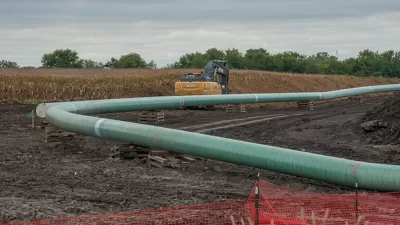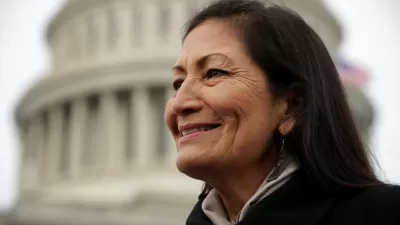Don't expect President Obama to issue a yes or no decision on whether to build TransCanada's Keystone XL pipeline until after the November elections. A pending Nebraska court case and millions of public comments were given as the reason for the delay
The State Department's decision to delay decision on the controversial pipeline, which would extend 1,179 miles from Hardisty, Alberta to Steele City, Neb. (according to its website) was greeted with predictable reactions.
"Republicans (and some Democrats) who support the pipeline denounced the delay — placing the blame on President Obama — while environmental groups hailed it as a sign that the project will not move forward," writes David Jackson.
The court case, which we posted here in February, is not from environmentalists but from private landowners trying to prevent their property from being seized through eminent domain. Coral Davenport of The New York Times writes that the State Department, which has authority in the decision because the pipeline crosses national borders, needed a "clearer idea how legal challenges to the pipeline’s route through Nebraska will be settled."
Michael Brune of the Sierra Club was predictably pleased.
"Any day without the Keystone XL pipeline is a good day because it means more dirty tar sands crude stays in the ground where it belongs," he said in a press release.
While the decision please the president's supporters in the environmental community, it was met with displeasure by some candidates in his own party facing tough reelections.
"Today's decision by the Administration amounts to nothing short of an indefinite delay of the Keystone Pipeline," stated Sen. Mary Landrieu, D-La.
Sen. Heidi Heitkamp, D-N.D., who is not facing reelection, did not mince her words in expressing her frustration.
"It's absolutely ridiculous that this well-over-five-year-long process is continuing for an undetermined amount of time."
FULL STORY: Administration again delays Keystone pipeline decision

Planetizen Federal Action Tracker
A weekly monitor of how Trump’s orders and actions are impacting planners and planning in America.

Restaurant Patios Were a Pandemic Win — Why Were They so Hard to Keep?
Social distancing requirements and changes in travel patterns prompted cities to pilot new uses for street and sidewalk space. Then it got complicated.

Maui's Vacation Rental Debate Turns Ugly
Verbal attacks, misinformation campaigns and fistfights plague a high-stakes debate to convert thousands of vacation rentals into long-term housing.

In California Battle of Housing vs. Environment, Housing Just Won
A new state law significantly limits the power of CEQA, an environmental review law that served as a powerful tool for blocking new development.

Boulder Eliminates Parking Minimums Citywide
Officials estimate the cost of building a single underground parking space at up to $100,000.

Orange County, Florida Adopts Largest US “Sprawl Repair” Code
The ‘Orange Code’ seeks to rectify decades of sprawl-inducing, car-oriented development.
Urban Design for Planners 1: Software Tools
This six-course series explores essential urban design concepts using open source software and equips planners with the tools they need to participate fully in the urban design process.
Planning for Universal Design
Learn the tools for implementing Universal Design in planning regulations.
Heyer Gruel & Associates PA
JM Goldson LLC
Custer County Colorado
City of Camden Redevelopment Agency
City of Astoria
Transportation Research & Education Center (TREC) at Portland State University
Jefferson Parish Government
Camden Redevelopment Agency
City of Claremont




























